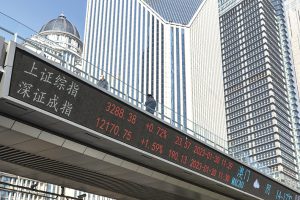BLOOMBERG
Chinese stocks jumped after authorities announced a slew of measures to woo back investors including a reduction of the stamp duty on stock trades and a slower pace of initial public offerings. The CSI 300 Index of mainland shares rallied as much as 5.5% on Monday, the most in three years, with some brokerage stocks gaining up to the limit.
The Hang Seng China Enterprises Index rose 3.8%, while the Hang Seng Index also advanced more than 3%. The levy charged on stock trades will drop from 0.1% to 0.05% as of August 28, the Ministry of Finance said in a statement, in a move to “invigorate capital markets and boost investor confidence.” The reduction is the first since 2008.
The China Securities Regulatory Commission also stated it will slow the pace of IPOs citing “recent market conditions,” without giving details on how it would do so. Regulators also restricted share sales by top stakeholders at firms whose stock prices have fallen below IPO levels or net asset levels and lowered margin ratios for leveraged trades, moves that investors said were a surprise.
“The scale, force and speed of the measures all beat expectations,” China International Capital Corp analysts including Pu Han said. “The increasing force of the policy tools will lift market confidence, amplifying the positive signal for the market.”
Traders said the measures announced in the latest round may have a shot at lifting markets, though questions remain on how long it will last. Authorities have been trying to dispel worries about the economy triggered by a slumping property market and weak consumer spending. Foreign investors sold mainland China stocks on a net basis for 13 consecutive sessions through Wednesday, the longest stretch ever, data compiled by Bloomberg show.
China last cut the stamp duty in April 2008, reducing it to 0.1% to support the market after a plunge, spurring a bull run the following year. The year prior, in May 2007, it raised the rate to 0.3% to cool a rally that was drawing more than 300,000 new investors a day. On the session following the 2008 cut, the Shanghai Composite rallied 9.3%.
The raft of changes this time are expected to bring the equivalent of 750 billion yuan ($103 billion) of new funds into the market per year, according to estimates from Huatai Securities.
 The Gulf Time Newspaper One of the finest business newspapers in the UAE brought to you by our professional writers and editors.
The Gulf Time Newspaper One of the finest business newspapers in the UAE brought to you by our professional writers and editors.
